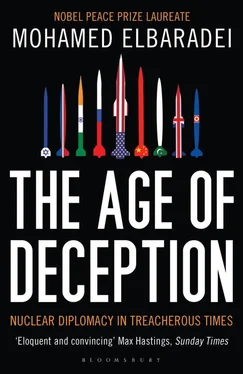I had heard none of this from Solana. His report had been only that the meeting had gone badly, achieving nothing after five hours. What I realized was that, despite frequent private assurances that he agreed with my point of view, Solana did not have the flexibility or the mandate to take initiative, particularly in light of U.S. insistence that nothing short of suspension was acceptable as a starting point.
Transcript retrieved at www.archives.cnn.com/TRANSCRIPTS/0802/10/le.01.html.
“Green salt” is another name for uranium tetrafluoride (UF 4).
William J. Broad and David E. Sanger, “Relying on Computer, U.S. Seeks to Prove Iran’s Nuclear Aims,” New York Times, November 13, 2005.
I had alerted South Africa to this omission, and mention was made in the resolution but not to any substantive effect.
“ElBaradei’s Real Agenda,” Wall Street Journal, February 25, 2008.
“Israeli Minister Says Sack ElBaradei over Iran,” Reuters, March 9, 2008.
“ElBaradei Is Quietly Managing to Disarm Iran,” Financial Times, February 27, 2008.
Scott Ritter, “Acts of War,” Truthdig, July 29, 2008. As usual, Ritter was quite emphatic: “Olli Heinonen might as well become a salaried member of the Bush administration, since he is operating in lock step with the U.S. government’s objective of painting Iran as a threat worthy of military action.”
As in any institution, there were differences of view among the many people providing input on complex issues, including between the lawyers and the technical people. My reports to the Board on Iran customarily went through ten to fifteen drafts, with painstaking efforts to get the facts straight and ensure objectivity in our assessments. But in each case, Olli and I agreed on the final report before its issuance.
Camilla Hall and Mike Schneider, “Kissinger Backs Direct U.S. Talks with Iran,” Bloomberg News, March 15, 2008.
Joy Lo Dico, “Jimmy Carter Calls for US to Make Friends with Iran after 27 Years,” In de pen dent, May 26, 2008.
“Five Former U.S. State Secretaries Urge Iran Talks,” Reuters, September 16, 2008.
Thomas Erdbrink, “Ahmadinejad Congratulates Obama, Urges ‘Real’ Change,” Washington Post, November 7, 2008.
Former assistant secretary of state and former U.S. ambassador to the United Nations.
On April 9, 2009, Clinton made the following comments during a joint press conference with Australian foreign minister Stephen Smith and U.S. defense secretary Robert Gates: “We don’t know what to believe about the Iranian program…. One of the reasons why we are participating in the P-5+1 is to enforce the international obligations that Iran should be meeting, to ensure that the IAEA is the source of credible information.”
Ryan J. Donmoyer, “Biden Says Israel Has ‘Sovereign Right’ to Hit Iran,” Bloomberg News, July 6, 2009.
“Obama: No Green Light for Israel to Attack Iran,” CNN, July 7, 2009.
“Outgoing IAEA Chief Has Tough Choice on Iran,” Associated Press, August 20, 2009.
Barak Ravid, “Sources: UN Watchdog Hiding Evidence on Iran Nuclear Program,” Haaretz , August 19, 2009.
Yossi Melman, “Israel, U.S. Lost Faith in IAEA Long Ago,” Haaretz , August 19, 2009. In October 2010, two months after Olli Heinonen retired from the IAEA, he gave an interview to Haaretz in which he addressed the rumors that our relationship had been tense: “It is true that we had some arguments. And it is true that there were some at the organization who tried to drive a wedge between us by spreading rumors. I am a technical person, and [Mohamed] deals on the diplomatic-political level. Sometimes there was disagreement between us regarding the timing and the course to take; but, in fact, none of these arguments and differences of opinion did any harm to the agency’s mission of reporting what we saw.” Yossi Melman, “Behind the Scenes of UN Nuclear Inspection of Iran,” Haaretz , October 22, 2010.
The accuracy of these accusations has never been verified; however, it is significant that the conclusions of the U.S. National Intelligence Estimate were not changed, indicating that they, at least, did not buy the “evidence” put forward by Israel.
In January 2011, the outgoing Mossad chief Meir Dagan said he did not believe that Iran would have a nuclear weapon for at least another four years. Yossi Melman, “Outgoing Mossad Chief: Iran Won’t Have Nuclear Capability Before 2015,” Haaretz , January 7, 2011.
“France Accuses UN Watchdog of Hiding Iran Nuclear Evidence,” Agence France-Presse, September 3, 2009.
George Jahn, “Nuke Agency Says Iran Can Make a Bomb,” Associated Press, September 17, 2009.
“Excerpts from Internal IAEA Document on Alleged Iranian Nuclear Weaponization,” ISIS, October 2, 2009. Retrieved at www.isis-online.org/uploads/isis-reports/documents/IAEA_info_3October2009.pdf.
I was told that Aghazadeh had resigned because he was apparently quite close to Mousavi, Ahmadinejad’s primary opponent in the 2009 presidential elections. Salehi was later appointed as foreign minister in December 2010.
The Iranians were always on the lookout for ways to increase their stock of natural uranium, since they had very little of their own, and it was unlikely that anyone would sell them more under the current circumstances.
Special adviser for nonproliferation and arms control at the U.S. State Department.
Special assistant to the president and White House coordinator for arms control and weapons of mass destruction, proliferation, and terrorism.
Einhorn had come to see me with Tom Pickering—another fine career diplomat—during the Bush administration, when they were working on the report of the bipartisan Iraq Study Group led by James Baker and Lee Hamilton.
I had discussed this with Salehi ahead of time. He said that if I wanted to approach the topic, I should only do so in a convoluted way. Apparently, in Farsi it is customary to make any critical remarks in a roundabout manner.
Jeff Mason, “Clinton Warns Iran of Need for Nuclear Progress,” Reuters, October 11, 2009.
“Remarks with Russian Foreign Minister Sergey Lavrov,” October 13, 2009. Transcript retrieved at www.state.gov/secretary/rm/2009a/10/130505.htm.
“Don’t Pressure Iran, Says Russia,” BBC News Online, October 13, 2009.
Deputy head of the Russian Federal Atomic Energy Agency.
James Mackenzie, “France’s Sarkozy Raises Iran Sanction Threat,” Reuters, August 27, 2009.
Читать дальше












